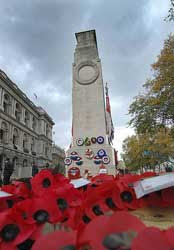So we've reached the end of the Olympic Games, and I'm sitting in Spitalfields Market to watch the closing ceremony. We've all been affected by having the Games in dear old London. For one thing, 70,000 of us have been volunteers, people of all ages and backgrounds who gave freely, cheerfully and with great common sense (that least common of gifts).
I've been enchanted by the 'ribbon of gold' wild flower park, which snakes through the Lee Valley, where I was born. We hope it will leave a lasting legacy. Time will tell whether the Olympic Stadium will do for the East End what Docklands did for the Port of London, i.e. push out the local people and replace them with Merchant Bankers. Please the Good Lord that in ten years' time the East End of London hasn't reverted to some sort of graveyard for the Olympic legacy that never was.
The secret behind the Games was the preparation - I couldn't help noticing. It applied to the organisers, the volunteers, the children who didn't even tell their parents their great secret - that they, not a famous sports celebrity, were going to light the cauldron in the stadium, and most of all the athletes.
So anyway now I'm looking at a synopsis for my W.I.P. Time was when I used to bash out the synopsis after I'd finished a story. Now I'm going to have a go at preparing it before I've started.
A good synopsis should mimic the novel's tone, according to Sarah Domet (90 Days To Your Novel). For example if the novel is fast-paced and exciting, the synopsis should be the same. If the novel is full of mystery, yes, the synopsis should be too. I've gathered that you must not leave out major plot points, and especially, the resolution. Pay attention to detail, hone, edit and re-edit. Don't stop, not until that finished story's in your hand and it's really, really time to go home. And right now, it's really, really time to go home. I close the notebook and head for the station.


















